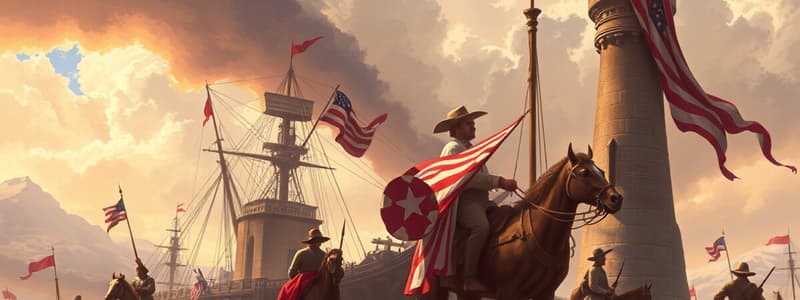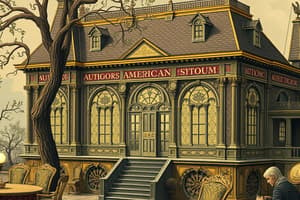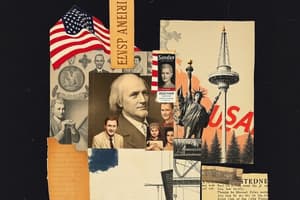Podcast
Questions and Answers
What does the American System, proposed by Henry Clay, include?
What does the American System, proposed by Henry Clay, include?
- Strong banking system
- Protective tariff
- Federally funded transportation network
- All of the above (correct)
What was the outcome of the Anglo-American Convention of 1818?
What was the outcome of the Anglo-American Convention of 1818?
It allowed New England fishermen access to Newfoundland fisheries and established the northern border of the Louisiana territory.
What was the main purpose of the Congress of Vienna?
What was the main purpose of the Congress of Vienna?
To redraw the boundaries of continental Europe after the defeat of Napoleonic France.
What was established in the case of Cohens v. Virginia (1821)?
What was established in the case of Cohens v. Virginia (1821)?
What did the Dartmouth College v. Woodward case (1819) protect?
What did the Dartmouth College v. Woodward case (1819) protect?
What does the term 'Era of Good Feelings' refer to?
What does the term 'Era of Good Feelings' refer to?
What did Fletcher v. Peck (1810) establish?
What did Fletcher v. Peck (1810) establish?
What was the Florida Purchase Treaty also known as?
What was the Florida Purchase Treaty also known as?
What did the Treaty of Ghent (1815) do?
What did the Treaty of Ghent (1815) do?
What issue did Gibbons v. Ogden (1824) address?
What issue did Gibbons v. Ogden (1824) address?
What was the purpose of the Hartford Convention?
What was the purpose of the Hartford Convention?
What did the Land Act of 1820 achieve?
What did the Land Act of 1820 achieve?
What does 'loose construction' refer to?
What does 'loose construction' refer to?
What was the Missouri Compromise?
What was the Missouri Compromise?
What did McCulloch v. Maryland (1819) uphold?
What did McCulloch v. Maryland (1819) uphold?
What was the Monroe Doctrine?
What was the Monroe Doctrine?
What was the outcome of the Battle of New Orleans?
What was the outcome of the Battle of New Orleans?
What triggered the Panic of 1819?
What triggered the Panic of 1819?
What does the term 'peculiar institution' refer to?
What does the term 'peculiar institution' refer to?
What was established by the Rush-Bagot Agreement?
What was established by the Rush-Bagot Agreement?
What did the Russo-American Treaty of 1824 fix?
What did the Russo-American Treaty of 1824 fix?
What was the significance of the Tariff of 1816?
What was the significance of the Tariff of 1816?
What was the Tallmadge Amendment?
What was the Tallmadge Amendment?
What was the War of 1812 fought over?
What was the War of 1812 fought over?
Flashcards are hidden until you start studying
Study Notes
American System
- Proposed by Henry Clay in the 1820s, aimed to boost American industry.
- Included a strong banking system, a protective tariff, and a transportation network funded by the federal government.
Anglo-American Convention
- Signed in 1818 between Britain and the United States.
- Granted New England fishermen access to Newfoundland fisheries and defined the northern border of the Louisiana territory.
- Established joint occupation of the Oregon Country for a decade.
Congress of Vienna
- Held from 1814 to 1815 by major European powers post-Napoleon.
- Aimed to re-establish territorial boundaries and balance of power in Europe.
Cohens v. Virginia
- Supreme Court case from 1821 that asserted federal authority.
- Allowed the Supreme Court to review decisions of state supreme courts regarding federal powers.
Dartmouth College v. Woodward
- Supreme Court ruling in 1819 that protected Dartmouth's original charter from state interference.
- Established principles to protect corporate charters from governmental overreach.
Era of Good Feelings
- Period during James Monroe's presidency (1816-1824) characterized by one-party Republican dominance.
- Despite its name, the era was marked by conflicts over issues like internal improvements, slavery, and banking.
Fletcher v. Peck
- A landmark case from 1810 that strengthened property rights.
- Established the Supreme Court's ability to invalidate state laws conflicting with the federal Constitution.
Florida Purchase Treaty (Adams-Onis Treaty)
- Finalized in 1819, Spain ceded Florida to the United States.
- In exchange, the U.S. abandoned claims to Texas, resolving border disputes.
Treaty of Ghent
- Signed in 1815, it ended the War of 1812.
- Restored pre-war borders without addressing the underlying grievances.
Gibbons v. Ogden
- A 1824 case regarding interstate commerce and state monopolies.
- Reinforced that Congress holds exclusive power to regulate interstate commerce.
Hartford Convention
- Held during 1814-1815 by Federalists from New England states.
- Opposed the War of 1812 and expressed dissatisfaction with the political dominance of Southern and Western interests.
Land Act of 1820
- Legislation that facilitated settlement in Northwest and Missouri territories.
- Reduced public land prices and prohibited credit purchases, addressing factors that contributed to the Panic of 1819.
Loose Construction
- Legal interpretation suggesting that the federal government can exercise implied powers not explicitly stated in the Constitution.
Missouri Compromise
- Enacted in 1820 allowing Missouri as a slave state while admitting Maine as a free state.
- Established a boundary line prohibiting slavery in the Louisiana Purchase territories north of 36°30' latitude.
McCulloch v. Maryland
- Landmark 1819 Supreme Court case validating federal authority over state laws.
- Confirmed the constitutionality of the Bank of the United States, asserting states could not tax it.
Monroe Doctrine
- Proclaimed in 1823 by President James Monroe, warning European nations against colonial expansion in the Americas.
- The doctrine was largely enforced not by the U.S. but by Britain due to its commercial interests.
Battle of New Orleans
- Took place in January 1815, where American forces achieved a significant victory against the British.
- Boosted national pride and concluded military engagement of the War of 1812.
Panic of 1819
- Severe economic downturn triggered by the Bank of the United States' contraction of credit for land speculation.
- Disproportionately hurt poorer populations and contributed to the rise of Jacksonian Democracy.
Peculiar Institution
- A term for slavery in the South, highlighting the growing sectional tensions with the North, where slavery was being abolished.
Rush-Bagot Agreement
- Signed in 1817 between the U.S. and Britain to limit naval armaments on the Great Lakes.
- Initiated the demilitarization process along the U.S.-Canadian border, finalized in the 1870s.
Russo-American Treaty
- Signed in 1824, it defined the boundary of Russian territories in North America at 54°40'.
Tariff of 1816
- Marked as the first protective tariff in U.S. history.
- Aimed to protect New England manufacturers from British goods flooding the market after the War of 1812.
Tallmadge Amendment
- Proposed in 1819 to limit slave importation into Missouri and promote gradual emancipation.
- Faced fierce opposition from Southern states fearing disruption of the sectional balance.
War of 1812
- Conflict from 1812 to 1815 between Britain and the U.S. primarily over trade rights and impressment.
- Though ending inconclusively, it showcased America's resolve to defend its interests, earning respect internationally.
Studying That Suits You
Use AI to generate personalized quizzes and flashcards to suit your learning preferences.




